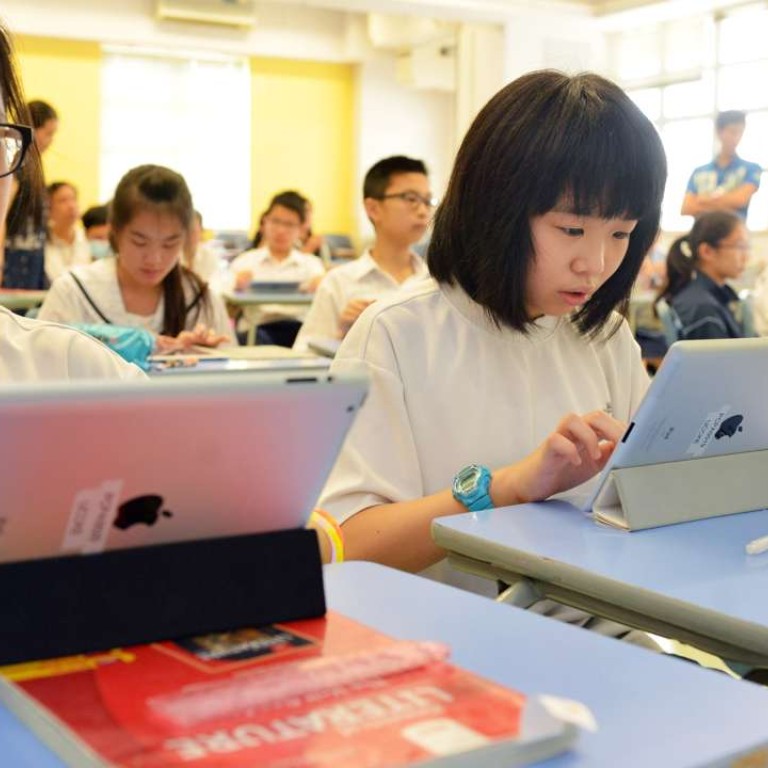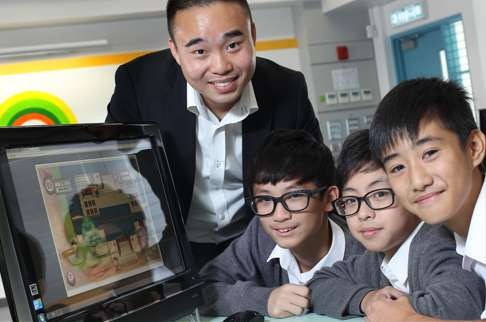
E-learning is the way forward for quality education in today’s world
Irwin King says we must take risks to turn Hong Kong’s passive culture of rote-learning into creative learning, and the government has made moves in the right direction
As a knowledge-based and technologically driven society, Hong Kong is well placed to adopt e-learning in a big way. Yet, e-learning in the city lags behind other advanced economies in the region, with its priorities still being Wi-fi installation in all public sector schools and the introduction of more e-books.
Instead of narrowly focusing on hardware limitations, what Hong Kong seriously needs is the courage to take risks on the part of all educators.
First, misconceptions about e-learning should be cleared. There is a fear among many that e-learning means less student contact with teachers. However, e-learning can in fact do the opposite by promoting self- and peer-learning, which in turn fosters better and increased student-teacher interaction. A willingness to take risks and educate students differently will help turn the city’s uninspiring culture of passive rote-learning into active, creative learning.
There is a fear among many that e-learning means less student contact with teachers. However, it can do the opposite
Commendably, the Hong Kong government understands the potential of e-learning. The Education Bureau has been heavily promoting science, technology, engineering and mathematics (Stem) education to foster youth innovation.
However, there is little emphasis on e-learning in Stem, and the key issue is that there is, as yet, no integrated plan that drives e-learning across all levels of the education system. The government needs to provide a coherent plan.
To begin with, for primary and secondary schools, e-learning has to go beyond e-books that display text on a screen or full Wi-fi connectivity. Teachers need to develop quality e-learning materials in both Chinese and English to encourage active learning. This includes making use of interactive audio-visuals. More importantly, there is a behaviour-tracking element in content refinement, and the use of intelligent software can spot if a student is continually making the same mistakes, for instance, which will allow teachers to more effectively address the learning needs of individuals in a personalised and targeted way.

E-learning makes further education a reality for tens of thousands of Africans
At the tertiary level, the University Grants Committee (UGC) has responded to the trend of global learning by funding the Knowledge and Education Exchange Platform, which is a collaboration of all UGC-funded institutions to capture online learning and diverse education content around the globe.
With this project as a stepping stone, universities in Hong Kong should develop a policy of e-learning. Two specific changes can be made in this regard.
Learning should be fun, and gamification is central to e-learning
First, universities should embrace e-learning. To this end, the Chinese University’s engineering faculty has launched the Centre for eLearning Innovation and Technology to disseminate e-learning content and related materials. The faculty is also moving its foundational engineering and mathematics courses to e-learning format, with the aim of providing them to high-school students too. And if there are any doubts about how much hands-on experience e-learning can provide, the faculty has integrated hands-on lab courses with online materials in the Stem framework.
Second, students should be able to earn course credits after they successfully complete online courses. Universities should be boldly making this move as e-learning is already substantively shaping the future of education worldwide.
Parents also have a role to play. Many see playing games to be a bad thing. Yet, learning should be fun, and the use of gaming is central to e-learning. Question-and-answer type of quizzes and games online have been proven to stimulate peer discussion and healthy competition between students just as they foster a more active and inquiring way of learning.
E-learning is not a cure for all, but it is a critical tool for quality learning in today’s world. In placing the needs and desires of students at the heart of the education experience, educators and parents have to keep up with the times.
Irwin King is associate dean (education) of the Engineering Faculty and professor in the Department of Computer Science and Engineering at the Chinese University of Hong Kong
